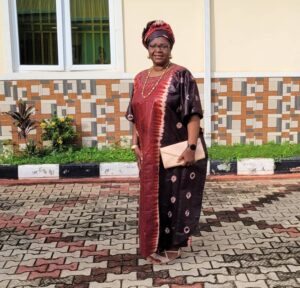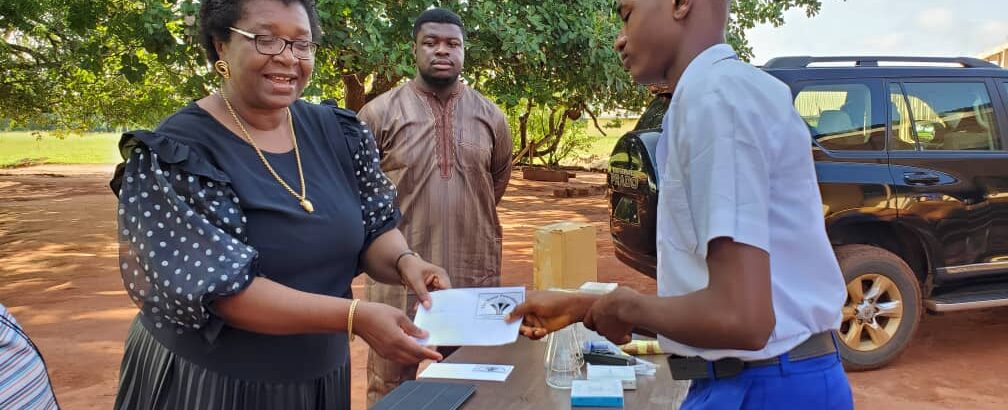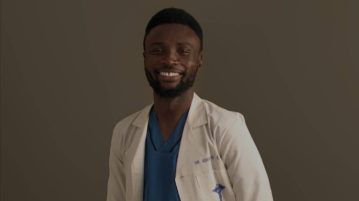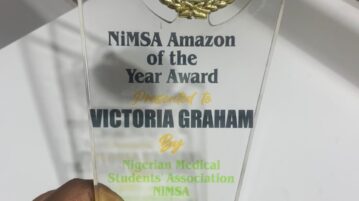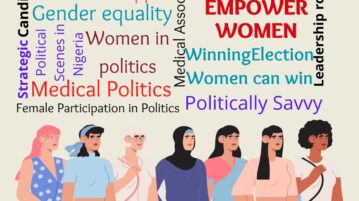There has been different dynamics to the recent happenings in medical and political sector of the nation – Nigeria. Hence, one of our Medical Mirror (MM) correspondents, linked up with one of the renowned medical elder actively at the intersection of both sectors; to share her views and recommendations on the participation of medical practitioners, the state of our healthcare in Nigeria and beyond.
Interview with Dr. Mrs. Minne Oseji (MB.BS, DTM&H, DHSM, MPH (HSR), FMCPH, FWACP), Consultant Public Health and Community Physician/Health Services Researcher, former Director of Public Health and Permanent Secretary, Ministry of Health and current Permanent Secretary, Delta State Ministry of Environment.
MM: Good day ma and thank you for granting this interview with you. First, we’d like to meet you and have a little insight into your background – family, education – and journey as a healthcare practitioner ma?
I am Dr. Mrs. Minimim Oseji, normally shortened to “Minnie”, because many people erroneously spell and pronounce it as “minimum”. Plus, if you see my physique, I am anything but “minimum” (laughs). I was born several years ago to the Honourable Justice Wilkison Harrison Kio Lawson and Mrs. Gloria Alowiba Kio Lawson from Buguma in Rivers State, Nigeria. I went to Port-Harcourt Primary School, then Federal Government Girls’ College, Owerri and to the University of Port-Harcourt (UNIPORT) – were I got my MB.BS degree. Following this, I did my housemanship at the University of Port-Harcourt Teaching Hospital (UPTH), and my youth service at the Maternal and Child Healthcare Centre in Makurdi, Benue State. On completion of NYSC, I went on to work as a Medical Officer at the General Hospital, Makurdi, Benue State. After I got married, I transferred my service to the Central Hospital in Agbor, Delta State of Nigeria. I also worked briefly at the Central Hospital in Asaba, before proceeding on for my residency at the University of Benin Teaching Hospital (UBTH), Benin City.
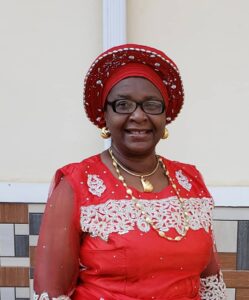
I qualified as a Fellow of National Postgraduate Medical College and returned to the Hospital Management Board in Delta State as a Consultant Public Health and Community Physician. I worked in the General Hospital, Okwe-Asaba, as the pioneer Zonal Medical Director and Head of Department for Public Health. This I set up during my four years of work at the General Hospital, and then moved to the Ministry of Health as Director of Public Health. I was at the Ministry for nine years, after which I was appointed as a Permanent Secretary, and posted to the Primary Health Care Development Agency and was there for two years. Then I returned back to the Ministry of Health to work for another four years, until I was posted to the Ministry of Environment as the Permanent Secretary, where I am currently. This is my career in a nutshell.
MM: Great! However, looking back to your medical education, can you share with us one of your interesting events and political involvement in medical school (if any)?
There are a number of events that stuck with me from medical school, but the fondest memory I have was being called “Ogbambo of the class”. Ogbambo is an Igbo terminology that connotes someone as overzealous, always wanting to do the difficult things every other person is running away from. For me, I was always volunteering, got noticed by the lecturers and even sometimes get “harassed” by them to my own detriment. So, this name – “Ogbambo” – remained for several years till we graduated, since we maintained the same class.
Then in UNIPORT, we had a two-tier programme where we get a B.Med Science in Anatomy, Physiology or Pharmacology, before moving on to clinicals to get the MB; BS, and by the time we graduate, we usually have two degrees.
A typical example of why I got this name, was when I “caught” the new-year-baby. Towards the end of our Obstetrics and Gynaecology (O&G) posting – close to the new year – It was announced (as usual) that the first lady would be coming to visit the new-year-baby and I thought to myself, “it will be so cool if I could be the one to deliver the new year baby”. So, I made the move and started hovering around the labour ward; and discovered that many of the students had gone on holiday and those available were not ready to participate (even those who were supposed to be on call). This didn’t deter me, but made me take it upon myself to look at all the women in labour and identify those that would likely put to bed by morning. I then clerked, followed-up with monitoring, using the partograph and one of them progressed into the second stage of labour with active signs. I started preparing everything needed, eventually took that delivery and registered it in the delivery book. When the first lady came later on that day to present the baby gifts, even though I was not there, the news spread round the class that I “caught” the New Year baby and they kept giving me that look of “oh, this Ogbambo has come again” (laughs).
Another example was my experience with an “ectopic pregnancy” case I witnessed at the Accidents and Emergency (A&E). That day, I was not on call but my house was close to the teaching hospital. Also, if I saw any interesting case back then, I just go to the A&E and call my parents to inform them that, “I won’t be coming home today, I am going to sleep in the hospital and follow this case up”. So, this case came in, and I followed her management from the A&E till she was taken to the theatre, and finally to the ward after she recovered from the Anaesthesia in the theatre. By the time, we were done and had to indicate all the procedures I observed in my logbook to be signed off, I realized it was daybreak. All I could do was go back home, take my bath and return for my lectures of the day.
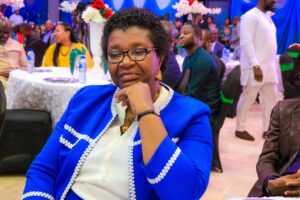
During the day, immediately one of the lecturers – Professor Kelson Harrison (a renowned professor of Obstetrics and Gynecology who did a lot of research on anaemia in pregnancy) – came into the class, the first thing he said was, “something happened yesterday that warmed my heart, Miss Kio Lawson (that was my maiden name) saw a case of ectopic pregnancy and followed the case all through the accident and emergency, through surgery and recovery in the theatre, all the way to the ward. This makes me very happy because the memory of that case will be forever etched in her mind”. Well, he knew he was giving me a compliment but for me – already overwhelmed and embarrassed from been called “Ogbambo of the class”, with heads flipping to give me that “Ogbambo has come again” look – at that moment, I really wished the ground could just open and swallow me. These are the experiences I had in medical school that I always remember.
For political involvement, in 1988 and we were invited to come to Lagos for an IFMSA event been hosted by the Nigerian Medical Students’ Association (NiMSA). I felt it was going to be a good opportunity to interact and meet medical students from other countries; and by the special grace of God, my Mum sponsored the trip, and I went to Lagos. It was an interesting event with lectures, meetings, boat ride and other activities to interact with a lot of people. That was the first international event I was participating in, which was very rewarding for me and thankfully today, I am able to participate at various international conferences across different fora.
The International Federation of Medical Students Associations (IFMSA), founded in 1951, is one of the world’s oldest and largest student-run organisations.
MM: That was enlightening. Knowing you are active in the policy development space, state and national ministry of health, as well as primary health care; how would you describe the current state of health policy implementation across all levels and the healthcare sector as a whole?
I would like to describe our healthcare sector as “fair”, but it could be better. We need better monitoring and evaluation to leverage the power of results. It is said, “if you do not measure results, you cannot tell success from failure; if cannot see success, you cannot reward it; if you cannot reward success, you are probably rewarding failure; if you cannot see success, you cannot learn from it; and if you cannot recognize failure, you cannot correct it”. So, if we have mechanisms to monitor and carry out “self-auditing”, we can then ask ourselves, “why are we not getting there?”. We measure, and then if we discover that there is a challenge, we do something about it. Not being able to do this effectively, for me, is our major drawback in the Nigerian health sector.
MM: Now, as a medical elder that rose through ranks both in the private, public and non-government sector; what would you say is the most important lesson that stood out for you – in being successful or able to keep progressing and remaining relevant?
Personally, the answer is very simple and it is – Trusting in God – that with Him, all things are possible. This is exemplified in my being a multiple grant recipient and facilitating others to do so. For more context and understanding on “trusting in God” – when we were much younger, attending Christian programs and we hear “men of God” talk about trusting God for big things such as moving on to possess your possession, getting to the top and be successful – it sounds abstract, like a myth… but truly, that was just how it all happened to me. Whatever I wanted, I just presented it to God.
You will find it interesting to note, that I didn’t start my residency immediately. I started my residency 6 years post-NYSC at the University of Benin Teaching Hospital (UBTH) and by that time, I was already one of the oldest residents. I felt old because many of the other residents started straight from youth service. However, I was not discouraged, I continued, focused, and presented every challenge I met before God.
I remember arriving at UBTH then with my primaries from the National Postgraduate Medical College (NPMC) and had to apply for exemption in the other fellowship (West African College). This was because the West African College required 18months of residency before writing the part 1 exam, while National College required two-years. So, I tried the West African College exam and got it at first sitting, then 6months later, I did my National’ and got it as well. After this, I committed my part II exam into God’s hands – presented it before Him – and went in for it with much vigor! That vigor, was not something I got by myself, but God gave it to me. Incidentally, I got approval for my National’s exam dissertation first during that period first, for which I did, wrote the exam, submitted the completed work, defended in May and passed. I not only passed but came out the overall best candidate and won the prize for the project I did – by virtue of the technicality of my dissertation. Within four years, I was done with residency, is that not God? However, two years later, after I had left the residency program and gone back to the hospital management board in Delta state, I had to return to complete my West African’ and defend my project because I had put in so much work into the dissertation. This also turned out very good. Hence, my emphasis on “in all things I presented it before God” and things have been in leaps and bounds for me, even those things I didn’t ask for.
For instance, as a multiple grant recipient, the first grant I ever got in year 2001 was for me to get a diploma in tropical medicine and hygiene at the London School of Hygiene and Tropical Medicine. I had applied to at least six different organizations for sponsorship, but none was forth coming and was about writing to the school – to inform them I could not afford the cost and my position should be given to someone else. However, something happened; I had then left Asaba (where I was working as a Consultant) to UBTH, and we had some arrears of salaries they were yet to be paid, but on checking my account that fateful day, I found that the arrears were paid. I was so happy I went to the cybercafé, and on getting there the lady at the café gave me my printed email and I read on it that I had been given a scholarship of seven thousand pounds to go to the London School of Hygiene and Tropical Medicine.
PS: Then, we didn’t have email access like we did now, we’d have to go to the cybercafé to check our emails and print them out. So, I gave a standing order to the lady there – because I never liked wasting time – that once I have an email, she should print it and whenever I come, I will pay for it and collect it from her. This was what happened in this scenario.
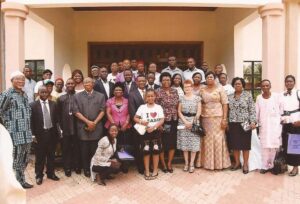
Initially, I had gotten the admission the year before but was denied visa because I didn’t have enough proof of funds in my account. I didn’t know I couldn’t just tell them that I had money, as I only had NGN 35,000 in my account at the time I was going to the embassy and did not know that I needed to put any funds I was declaring in the account as well. Even though the reason I had NGN 35,000 was because NARD had been on strike for 5 months and our salaries were withheld, they still wanted to know and see evidence of where I’d get money from. I told them my husband was going to help me with the money but they said no, that I was supposed to have put the money in an account, printed out the statement of account and so I was denied the visa. I informed the school in London of the situation, they gave me the option to defer till the next year and the next year, I got a scholarship. That is God!
MM: Wow! Very inspiring. Concerning your research dissertation and the prize attached for coming out the overall best, I don’t think a lot of us know about it. Could you please give an insight into the process attached for winning the prize ma?
(Laughing) When you said some people are not even aware that there is a prize attached to fellowship dissertation, it made me laugh. You know, the bible says, “my people perish for lack of knowledge”. Well, when I was preparing my dissertation, I just wanted to pass at first sitting so I had to do it with all my heart. The title of my dissertation was “the prevalence of byssinosis and respiratory diseases in a textile mile industry in Asaba”; I had to do lung function test before the workers got to their stations and after they left. This made me schedule visits to the factory as early as 6am and be there till as late as 11pm. One of the workers then had to come ask me, “what are you going to gain from this work that you are doing with so much passion? Being a woman… coming so early in the morning, staying so late into the night, visiting the various sections of the factory, examining people and all that”, most likely because he had never seen anybody, especially a Nigerian work so hard as I was doing. I didn’t know how to explain to him that I was doing it for my dissertation, so I just told him that when I finish the project I was going to be promoted (and of course it meant I was going to be promoted from being a senior registrar, to being a consultant) and he was satisfied.
This was my motivation at that time; to finish residency and move on to something else, especially because I was already older than most of the residents when I started and didn’t want to be there for 6 to 10 years or asked to leave, and then not know whether I would finish or not. Initially, when I started as well, I didn’t know there was going to be any prize but as God would have it; I did the part II, viva, defense of the dissertation and later on, got the prize. When I was informed that I had won the prize, my informant told me that we were two who got the highest results amongst those who did part II but I was given the prize because of the technicality involved in my dissertation, that is the JD Soleye Prize. Incidentally, I participated in the convocation of new fellows at Ijanikin – where the National Postgraduate Medical College of Nigeria is domiciled – and I was very happy to see another female fellow newly qualified, win the JD Soleye prize and we took photographs together.
Likewise, some years back I interacted with one of the registrars in the National Postgraduate Medical College of Nigeria (NPMCN) who took a liking to me and told me that, the NPMCN often give out grants for different things and most times, people from Delta state had not benefitted from it. I asked for more information and found out that they provided travel grants. Then, I had gotten a grant to travel to Paris for the 9th HIV Science Conference organized by the International AIDS Society. It was when I was done applying and attending, I discovered that they took care of my flight ticket from Lagos, my registration for the conference, my accommodation and provided a stipend of about 220 Euros but they didn’t cover my flight from Asaba to Lagos, my visa application and some other travel costs. So, when I heard about the grant from the NPMCN with a maximum of NGN 200,000; I put in my application, informing them I had gotten a grant but it didn’t cover everything and would be grateful if I could get some support. After I had returned from the conference and submitted the application, they replied to me – asking to provide a report of the conference, which I did. I provided a very beautiful report indicating my participation with pictures of two step down activities I had organized since I came back from the conference. They then requested for the certificate of the conference; I checked for it online, got my certificate, sent it to them and the next thing I found was NGN 200,000 being paid into my account.
I shared that information with the examiners when I went for the Faculty of Public Health examinations in Lagos and it was like giving a testimony. I am sure they were some examiners who had been there for several years longer than myself, who were not even aware that such grants were available from the National Postgraduate College of Nigeria.
MM: As the Immediate past National President for the Medical Women’s Association of Nigeria (MWAN); When did you first hear of MWAN? How did you venture into it and your trajectory from then to now? what are the major challenges facing the organisation? and in what areas would you like the public, specific organisations and government to support the organisation?
I became very active in Edo State where bagged my first post as Treasurer of Edo State MWAN in 1999. Twenty years later, I was inaugurated as National President and I’ll like to appreciate my mentors for this feat. I first heard of MWAN in 1995 before I left Benue State but I was not active. By the time I eventually got to Edo State, in 1998 I went for the first meeting, and what they were discussing resonated with me. I was a young mother then and there; I saw young mothers like myself and older mothers talking about the peculiar challenges’ we females have in the profession. So, I continued to attend, participate and in 1999, I was given my first post as a treasurer of the association.
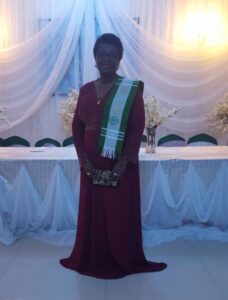
I would like to use this opportunity to appreciate my MWAN mentors; starting from Dr Valentina Ideh, who was the president when I was MWAN Edo State treasurer. I learnt so much from her, she was very organized, very versatile, and led us to Sydney, which was the first international conference I ever attended outside this country. Remember, in 1988 I attended the IFMSA conference in Lagos but never attended a conference outside the country. So, in 2001, she led a five-woman delegation of Medical Women from Edo State to the MWIA conference in Sydney. The other person I have to thank is Professor Angela Okolo – she is my mentor of all Mentors, my number one mentor. I learnt so much from her and when she discovered that if she gives an assignment, I will carry it out and produce a report for it, she developed an affinity for me. Such that, when I got tired and started dodging her, she actually came to my department (i.e., department of Community Medicine in UBTH) to seek me out again.
The beauty of MWAN is that we attend both national and international programmes where we can get mentorship from people outside our immediate environment, such as the likes of Dr Dorothy Esangbedo, Dr Silvia Effanga, Dr Claribel Abam, Dr Okara, Dr Kechi Ogbuagu and so many others. As we were interacting with them, we learnt; at every encounter, you learn something new. That is why, when people ask, “why do you need a MWAN, when we have NMA?”, I always say “NMA does not give what MWAN gives” and people need to understand this.
When I finished my residency in year 2001 and came to Delta State, there was no MWAN in the State. There had been discussions before to initiate it, but nothing concrete was done, and we had a situation when Bendel State was divided into Edo State and Delta State. Dr Rosebud Nwafor (based in Warri) was supposed to be in charge of the Delta State section, but over the years, nothing much happened. We were not going for NEC meetings, neither were we paying dues; it was like there was no Delta MWAN. By 2003, we officially inaugurated Delta State MWAN with me as a pioneer president and handed over in 2005 after my tenure ended. We continued, despite having some issues but by God’s grace of God, by year 2011, we were able to sort those issues and were fully involved in all the national and international activities. By the year 2017, through the grace of God again, I was able to contest for the post of the national president-elect for the third time and I won in a landslide, and the rest, is history.
Now, to specific areas of support to the government and other organizations; I would say, they should learn from the best practices of MWAN and scale up. For context, during my tenure, I was able to produce as much as ten different publications which are on our website. An example is the publication on “how we were able to cut neonatal tetanus through our interventions to drop from 14 cases in 2020 to 2 cases in 2021” at a particular tertiary health facility in Zamfara state. These publications are available on our website, so that people can access them or even download them to see what we did. Other examples are the documentations on “What we did for cancer care – where we were able to provide funding for several people to benefit from the cancer care”, “What we did in building competencies in various fields through our CME programmes”, “How we monitored and evaluate our activities to know whether we are achieving our set goals, deviating from them or distracted”, “How we conducted advocacy to Governors and even the President of Nigeria”, “How we were able to work with men – who became our champion – and keep celebrating them”.
Concerning this, we were able to decorate up to 17 male champions who identified with MWAN in such unique ways and met our criteria. We discovered that when we did this, most of the suspicion men have when they see us (women) gathered together disintegrated, because they will always ask “why do you need to have a women’s organization” and when we give them our reasons, it impresses them. Also, by the time we were decorating them, it seemed like we were pampering and petting them, with all their inhibition dissolved or thrown away. In that instance, if we wanted to ask for gold, I’m sure we will get it. This goes to reinforce a very interesting say in the bible, that I realized, that “truly, without the word you can’t win over a man”, and our decoration of champions demonstrated that.
MM: Let’s talk family; knowing your husband (may his soul rest in perfect peace) was a Supreme Court Judge active in the Ministry of Justice and you being a woman grounded in your career, what was the balance for both of you? In terms of family life with work?
It was not easy at first but over time we began to understand how best to be there for each other. We came from two very different backgrounds; we had our ups and downs, but being Godfearing made the entire great difference. That by our 20 years Wedding Anniversary, we decided to launch “The Oseji Foundation for Transparency and Community Development”, in appreciation to God for keeping us together for Twenty years and to also to give back to society. About striking a balance, I would give two anecdotes of how important being God fearing is to achieve this. Like I said, we had our ups and downs, and there were times when we had disagreements but through prayers, presenting them to God, coming back together for reconciliation with tolerance and forgiveness helped us survive.
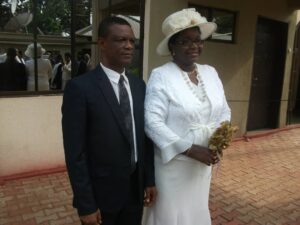
The first anecdote was during my residency programme. That day, as I was going about, I ran into someone, who was also from Delta State and he asked about my family. I told him my husband was in Asaba, while I was doing my residency in Benin and my children were with me. He then asked me a question, “are you sure there is no other woman in your home?” and I replied, “I don’t think so”. However, when my husband came for weekend, I asked him, “Honey, I met somebody who asked me – are you sure there is no other woman in your home? – so I’m asking you, is there any other woman in my home?” and he said no, which meant there was no other woman in my home in Asaba. I then further asked him, “so, what will make you ensure that you don’t bring another woman into my home in Asaba? While I’m here doing my residency in Benin”, and he replied that, the way God has blessed him, he will be afraid to do anything against his God – because he thinks that God would remove all those blessings. For me, that was the best form of response a woman needed as assurance from her husband. And this was one thing that helped us, because I knew a lot of women would be afraid to leave their matrimonial home, go somewhere else for up to five years – all in the name of training – in order to get an additional qualification and this may have killed the dreams of many young women.
The second scenario were issues that came up by the time I started climbing higher on the ladder of career. You know, this is associated with getting more administrative roles and coveting higher positions.
I became a director at age of 38 – there are so many people that became a director two years to retirement. I became a permanent secretary at the age of 47 – there are so many people that were sworn in as permanent secretary and three months later, they retired. Keeping in perspective that, when I started my residency, I was one of the oldest residents and was already looking at myself as a late comer. Only to move on in career and found out that, I got to a point where I was the youngest and that has been my story. Also, as I was having all these leadership roles and needed to go for many meetings (albeit taking a lot of my time), I discovered that most times, I was the only woman in those high-level meetings. Then I began to wonder how that happened and it came to me, that it was an accelerated progress in my career from God. This is why I always emphasis that, it all started with God, and it will end with God.
However, at a particular period when I was Permanent Secretary at the Ministry of Health, something happened and a lot of top government officials/functionaries – who were politicians, got to know about it – and were calling me, to scold me, shout at me and so on. On that fateful day, I was so miserable that when I got home, I met my husband at home and just pounced on him to release tension (if you know what I mean). I later realized that as you get up in leadership position, you will be faced with lots of critical situations that will be very stressful, and you will need to come to a stable home. A home where you can meet with love to help release all those tension from work and the leadership position. Also, on the flip side, because we have many more men in leadership positions, I thought about that as well – if they were facing with a lot of stress, contention, bombardments from different people in the workplace, and when they come home, if they wanted to continue the fights and bombardments with emotional boxing. Going in this line, causes a lot of chaos, nagging and all sorts of harassments in the home – with a tendency for the man to “branch and go to somewhere”, where he is able to get some “sweetness” – and it dawned on me that, this was a cause of a lot of broken homes in our society.
Many women don’t understand this because they never get to those leadership positions, where they are under that kind of tensions and stress. Hence, as much as possible, whether it is the man or the woman in the leadership position; we must always try to make the home a happy place. So that, whenever we come home – no matter what fight we must have faced outside – we come to a happy home to receive succour and solace.
MM: Interesting. Can we have a background on how you met your heartthrob and what would your advice be to medics looking to have or are already in inter- and intra-professional relationships ma?
I met my husband through his younger sister, who happened to have gone through the same University with me. During my youth service she came to visit and as a kind hostess, I decided to as well hang out with her; so, she gave me her home address and I went to visit her. It was during my visit to her; I met my husband who came along with another UNIPORT graduate – Pastor Chuks Anizor. They had just finished attending a full gospel businessmen fellowship meeting and she (my friend named Faith Ononogbo, who was also my husband’s sister) introduced us. We got talking and shortly after that first encounter, he came around to visit me with Pastor Chuks. Then, at his second visit, he asked if we could have a date? I said, “alone? No o, Pastor Chuks will have to come with us”. So, he ensured that and took us to dinner. On our way back, he dropped off Pastor Chuks first, and after that while driving me home, he indicated his intentions, and as a Christian then, we had to seek God’s face. I prayed and sought His face until I was convinced. However, when I finally got convinced, I told him that “even if I am convinced, I can still say NO. So, you have to propose properly, as you have not really proposed”. He then proposed, I said YES and the rest, is history.
On advice to medics, I actually wanted to marry a Doctor. I wanted to be able to do same things with him and more, but I was still opened to marrying somebody who wasn’t. I often remember the story of Perry Mason (male) and Della Street (female). Perry mason was a fictitious American lawyer in a book written by Earl Stanley Gardner and he had this very great secretary – Della Street. Growing up, we used to watch the show on TV and I like their relationship. So, I said to myself that I would like to work like the secretary of my husband and be doing things together with him. Obviously, that was a child’s thought and I didn’t understand then, that if I was going to have my own profession, it would be very difficult to work like a secretary. Then, it was like, I was hoping I could marry a doctor and the two of us will be working together – like the Perry Mason and Della Street kind of relationship – but man proposes and God disposes. My husband happened to be a lawyer, but my father was lawyer as well who became a judge, my brother also studied law and I had lots of uncles who are lawyers, so it wasn’t such a strange relationship. I knew a lot about law, not academically but about lawyers; how they behave, argue and reason. Finally, I believe that most important thing is for you to love each other, and if you are a Christian – you will be convinced that this is the relationship God wants you to enter. Also, if you keep the principles of a good relationship – as based in the Bible – it will work and these include: fear God and keep His commandments, have good and open communications with each other, be tolerant, forgiving, and always give your spouse the benefits of doubt.
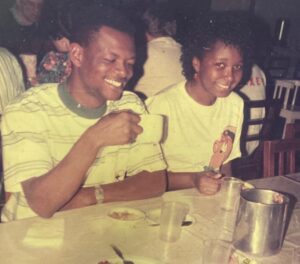
MM: Now at the global level, according to a 2018 study on Health Care Access and Quality observed across 195 countries around the world; Nigeria ranked 142nd. Quite disturbing.
What would you say is the cause for this?… And what do you think is being done or should be done at local, national and international by involved stakeholders to improve the healthcare system in Nigeria is improved?… Also, what measures are to be put in place as regards quality healthcare services delivery to Nigerians?
The main cause of our low health indices is lack of attention to detail. For what we can do generally, I will like to use my concluding statements in the series of MWAN monitoring and evaluation (M&E) sessions from last year (2021), that is: In order to improve the health indices of African nations like Nigeria, we must institute an efficient monitoring and evaluation system that involves all players in the health sector, using objectively verifiable indicators. Secondly, we must identify health workers who are doing well and motivate them financially and otherwise. Thirdly, we must identify health workers who persist in doing badly and sanction them appropriately.
Specifically, in our affairs today, we don’t need to reinvent the will. Instead, we can periodically identify and adopt best practices. For instance, Ondo state was doing a fantastic job with their TBA projects on maternal health; how many states in Nigeria went to Ondo state to study and copy the project pattern? We have best practices, but they are in pockets. Therefore, we need to scale up those best practices and make them universal. We need to be focused and shouldn’t have many projects, meetings and events because they distract and make us lose focus.
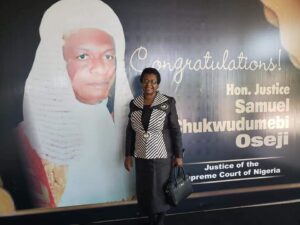
For measures on quality health care delivery services to Nigerians, I would like to highlight some items on the list of recommendations from my statement to the Honourable Minister for Health, while preparing for the African Regional Congress of the Medical Women’s International Association (MWIA NEAR Congress) that took place in Abuja, March 2021. First is the Maternal and perinatal death surveillance response. This is to ensure that for every maternal and perinatal death, we must find out how it happened and make sure it doesn’t happen again. When we are able to do this, we do not only improve services for maternal and perinatal health care, but will also improve other services that are central.
Another one is reversing medical tourism. This will require a quality assurance programme that would lead to accreditations that are internationally recognized. In Nigeria, we currently have the Society for Quality healthcare and other forms of quality healthcare programmes such as JCI, COSASA, safe way and so on. We would need all our health facilities to begin to apply for accreditations and go through the quality assurance programme that is standardized. Once, they are certified and gotten to a certain level of proficiency, then they would have to put in the work to maintain it.
Also, we need to promote intra-mural practice in our public facilities. Wherein, health professionals – particularly specialists or consultants – are allowed or supported to get more external training and they can come back to implement the training in their government facilities. This can also be applied to provision of medical equipment for government facilities, where the specialist or consultant who can provide them are enabled to so, with a set percentage of profit as incentive. This will allow for innovation and public private partnerships, especially for access to high tech equipment to provide needed varying highly specialized services.
Finally, incentivizing health workers and strategic partnership should be adequately looked into. Really, there are many people (organisations) with ideas we can partner with. Unfortunately, many government institutions do not key into these partnerships, because they are only keen about self-gain and are quick to ask: What are they bringing? How much money? They don’t take into consideration that, sometimes, beautiful ideas can be shared which could be scaled up without much cost. So, these are some of the things that we need to do, to improve the quality of healthcare in Nigeria.
MM: Moving on to politics and medicine (in and out of the medical space), what is the relationship between both? Also, In the recent past, we’ve had quite a number of medical personnel/health practitioners venture into politics and actually hold different significant posts at local, national and international levels in the political space of the nation.
How would you say this participation has contributed (either positively or negatively) to the healthcare sector development; in terms of policy formation, implementation, service delivery and so on to healthcare practitioners themselves and the general populace?
As medical doctors in medical associations such as NMA, MWAN and the likes, we can be political but not partisan. On medical doctors participating and holding high political position, I would like to use the peculiar case of Uduaghan & Okowa as governors of Delta State (both medical doctors), as reference point on how medical practitioners can venture into politics and mention some of their achievements.
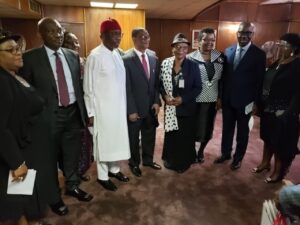
During the administration of Governor Uduaghan, he was able to implement several programmes in the health sector including the free maternal healthcare, under 5 children healthcare programme, the free rural healthcare scheme program, the implementation of up to 90% Plough-back policy for internally generated revenue from government owned hospitals and many more. In 2015, towards the end of Governor Uduaghan tenure (during an interview), I outlined some expectations from the governor Okowa administration, and I must say, he has exceeded those expectations. He instituted the National Health Insurance Scheme (NHIS) now known as the Comprehensive Health Insurance Scheme in Delta state and while working in the ministry as Permanent Secretary, I was able to actualize a lot of projects under his administration, including the Maternal Perinatal Death Surveillance and support for medical services provided by Federal Medical Centre. We were able to provide a 10-bedded isolation ward in the federal medical centre, which got completed just before the COVID pandemic and that was where our first cases of COVID were managed. Other infectious diseases are being managed there as well. Therefore, medical practitioners can be very good politicians, and this has been demonstrated in Delta State.
MM: Furthermore, with numerous strikes and brain drain, it is evident that Healthcare practitioners are not properly catered for in Nigeria. What would be your advice to the government and health practitioners in this trying times?
The occurrence of numerous strikes in the Nigerian health sector is a really very sad case, and I have always maintained that, if we implement advocacy more, there will be less need for strikes. This is the message I always give at the NMA meetings, particularly for the NARD. However, on the other hand, we want the government to keep to their agreements as much as possible. They shouldn’t go into agreements they cannot keep and should provide a holistic view of what they are agreeing to. They should be able to understand that, it’s not that doctors just want to “take, take, take” all the time but there are certain things being requested for. They should look at those things and understand the rationale behind them, and when they finally come to an agreement; everybody should work hard to keep to their end of the bargain.
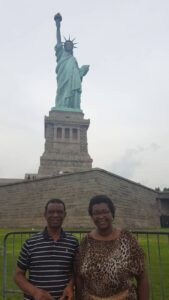
For instance, in Abia State – where they have not been paid the salaries of their medical practitioners and other health workers for over several months – I keep wondering and had to ask my colleagues there; do you actually have patients? and if you do, do these patients pay anything? Because I know that the health care in many government hospitals is subsidized, and we have a situation where salaries are being paid by government. So, the payment for services do not generate enough money to pay salaries. However, in a situation where the health workers are being owed for a long period, this serve as means to provide some revolving funds and keep the facilities running should be considered. For example, intermural practice for some services (outside the facilities) can be adopted or some form of. This would as well prevent situation such as what happened in Ondo State, where there was mass resignation of Doctors because they were not being paid salaries.
MM: Still on participation; female representations are visible marginalized in politics across all levels and sector. The newly elected NMA executive had no female on board, even in other medical associations and schools, most in their decades of existence barely have 1 or 2 female leaders.
Do you think this is a case of political apathy by females, or just males side-lining the females by dominating? Do you think a possible change is in sight for this rhetoric/narrative anytime soon? What would you suggest as the way forward for more inclusion of female in the political space across all levels and sector?
What happened at the NMA AGM in Port-Harcourt was very sad and I think people are actually scared of change that will not benefit them. We have had many active female members of NMA who can actually be elected to positions, but it appears some people still think and feel “it’s a man’s show”, and don’t seem to want to support women. As for us, all I can say for now is that; we will continue to support our women to contest at state and national levels with the hope that with time, things will change.
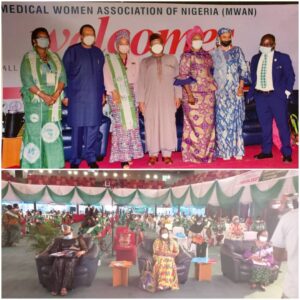
Also, the reason why we don’t have too many women in the political sphere generally (now, outside NMA) is because traditionally, the role of the woman has been limited to take care of the home. However, we have now realized that it is possible for women to lead, but there are a lot of people that are set in their ways and do not want to believe that that is possible. The second issue is that; women also have to actually “go out and contest”, because if you (as a woman) do not contest, they are not going to come and give you that position in your bedroom. Hence, we need to continue to support women to contest, and when they contest, we – women – should ensure that we vote for them.
MM: With the recent shift in global health space to digital and telehealth (majorly due to the pandemic but its use and adaptation now extending beyond the pandemic), how well do you think Nigeria is getting/settling into this digital system of medical treatment (i.e., use of technology device in the medical environment) and how much do you think (or forecast) we should invest into telehealth?
I would say Nigeria is doing abysmally as regards getting or settling into the digital system for medical treatment. This I believe is as a result of lack of understanding on the part of the companies on the way the Nigeria health system works and on the lack of ICT (knowledge and skills) or tech-savviness of the average Nigerian doctor. I have engaged about ten telemedicine companies trying to implement telemedicine before COVID, during the peak and even now that COVID appears to be under control. I have also participated in teleconsultations as a patient and as a provider, currently working out a collaboration with GESCAN and I must say; we still have a lot of challenges, and we are very far from ELDORADO. We however plan to train more doctors to familiarize with the different telemedicine applications available. This might take time and a lot of patience, but with determination, doctors and other health professionals can become technology savvy.
MM: On a lighter note, as a woman with a large responsibility, how do you unwind or destress? Share your tips to wellbeing as a health professional?
Well, when it comes to unwinding, I always say, “I work very hard and I play very hard”. Usually, I take my leave in different segments, and when I’m on leave, I use the opportunity to travel. It could be travel to somewhere within the country, outside the country or during any of the multiple conferences I have to attend outside the country – I normally would take a couple of days extra to sightsee. I love sightseeing, tourism, visiting new places and so on. I watch a lot of movies as well. Usually, when I get back from work, I just crash on my bed and watch a movie. Before, it used to be old movies like “different strokes”, “mind your language”, and “Cosby Show” that will make me laugh and forget the stress of the day; but these days, I’m now into new movies on YouTube in the hallmark channel. Also, I always play WordMaster electronic scrabble, I did that a lot, especially during the COVID 19 period. But somehow, after the regional congress in March last year, I kind of lost interest. I want to rekindle the interest again.
As for health and wellbeing, I encourage everyone to adopt good lifestyle changes and the first thing to do is your regular medical check-ups. This helps to know what risk factors a person might have. e.g., high blood pressure, high cholesterol, diabetes that is high blood sugar and so on. Also, as one advances in age, weight loss can be tricky. Especially, when menopausal but you can work on your weight by checking your calories, type of diets you take and also exercising. Likewise, shun vices like tobacco use, excessive alcohol and salt intake.
Furthermore, try not to allow things stress you up. I was at an outreach recently where we saw a lady with very high blood pressure, and she kept saying “she is under stress, she is under stress”. So, we need to take things easy, and this is also very important for one’s mental health. As much as possible commit your problems to God and leave them there. Many problems will solve themselves on their own; some others, God can provide divine intervention in a problem which you thought could not be solved, and others, God can give the best strategy to solve the problems.
MM: Finally, what are the life and career lesson you’d like to share with us, especially as young professionals looking to succeed, progress and diversify in the health sector? Thank you ma.
My life and career lessons I’d like to share with young professionals seeking to succeed progress and diversify are; join the “change train”, make change begin with you, bring out the president, governor and legislator in you. Set a goal for your office and home to be achieved in the next six months, develop indicators to determine how to monitor the achievements of that goal, work hard to accomplish that goal, and then share success story with someone else and recruit them in the “change train”. Then set another goal; that’s the way forward for our nation.
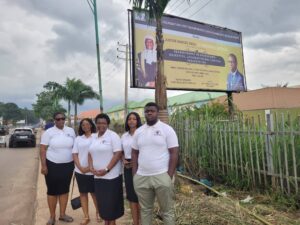
A medical woman colleague asked when we were in the Port-Harcourt NEC meeting of MWAN that, “what do we do about our nation’s politics? about PDP or APC?”, and I told her, “It is not even the political offices that matter; it’s you and I that will make the change”. If we can make the change and encourage others to do the same, gradually the entire nation will be different. To expatiate on my reason for stating goal setting, when I became Permanent Secretary to the Ministry of Health in December 2016, I set up some goals. They were about seven and I continually monitored them on a monthly basis and gave myself a performance percentage. By the end of the first year, in December 2017, the overall percentage was 17%. Around that period a relative of mine was criticizing Buhari that he was not performing, and I thought, “that makes two of us, I myself was not performing – scoring 17%”, and this is what I mean by “self-auditing”. So, what did I do? I went back, reviewed what the challenges were, what setbacks I had – that prevented me from achieving the goals I had set for myself. I identified the setbacks, there were about seventeen of them and presented them to God. I then developed strategies to address them all, prayed for destiny helpers, while I started pursuing my goals in a new manner. Some of those challenges were insubordinate staffs, lazy staffs, difficult superior officers and so on. By the end of December 2018, I had gone up to 68%. Therefore, regular self-audit would be my suggestion and advice for the younger ones.
